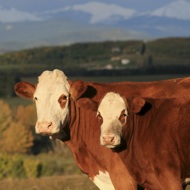Vets call for tougher bTB controls

“If we are to control bTB in England, as Wales is showing it is able to do, we consider that a fundamental change in emphasis and direction is needed."
A group of 26 scientists and vets have written to the Prime Minister, calling for his government to end badger culling and instead focus on cattle-based measures to control the spread of bovine tuberculosis (bTB).
The joint letter stated that whilst Wales has nearly halved the number of cattle slaughtered due to bTB over the last five years, "there has been little change to the levels of bTB in England during this time".
From 2009 to 2013, Wales has reduced the number of cattle slaughtered per annum from 11,671 to 6,102. Likewise, the number of new herd incidents in Wales since 2008/09 has reduced by approximately 36 per cent.
The signatories say that the Welsh government has achieved this reduction by undertaking TB health checks, strict annual testing and mandatory pre-movement testing across the whole of Wales.
In contrast, they add that the UK government and Defra have spent "considerable time, effort and resources on the promotion and implementation of badger culling, as a means of controlling bTB in England."
From the information available so far, the group states that it is not clear whether the forecast net reduction on 12 to 16 per cent in new herd incidence of bTB over the next nine years will be achieved or how this will be measured.
They carry on to say that "in the west of England, which has been under annual and pre-movement testing since 2010-11, the number of cattle slaughtered due to TB fell by 12% between 2012 and 2013 and this decline is continuing in 2014.
However, unlike Wales, England still has substantial parts of the country, with significant cattle populations under four-year testing regimes and not subject to mandatory pre-movement testing in so-called “low-risk areas”.
“If we are to control bTB in England, as Wales is showing it is able to do, we consider that a fundamental change in emphasis and direction is needed." the letter said.
"The time, effort and resources directed at the badger cull should be re-directed into a) a TB Health Check for England to establish the true extent and distribution of the disease in our cattle herds; b) considerably more testing in the low-risk area with the implementation of nationwide annual testing and c) the introduction of mandatory pre-movement testing and risk-based trading across the whole country."
Signatories include TV vet Marc Abraham, former RSPCA chief scientific officer Alastair MacMillan, and ZSL's Professor Ken Norris.
The open letter can be found at https://drive.google.com/file/d/0B1Lc_4v9UE_xSzZMdjZ0YkZaUFE/view?usp=sharing



 The Animal and Plant Health Agency (APHA) has updated its online reporting service for dead wild birds.
The Animal and Plant Health Agency (APHA) has updated its online reporting service for dead wild birds.